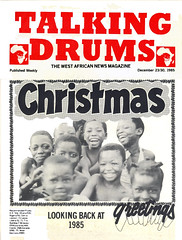Comment
As The Year Ends
His quiet, deliberate and sensible manner wins him friends daily and with his small neighbour, the Gambia, continues to enjoy the stability that is unknown in the rest of the region.
The high water mark of Captain Thomas Sankara's year came when he invited the visiting Bob Geldof to play the guitar with him. He did order his entire cabinet to the farms and appointed a fresh batch but that did not surprise anybody; that is what 'revolution' means to Captain Sankara.
In other words, the West African region has gone through another year in about the same manner as other years coups, attempted coups, rumours of coups and a general sense of instability.
A year ago, Gen Buhari was at his most insensitive best and quite firm in his belief that his countrymen did not need to be consulted on anything; they should obey him without questioning. The result was that he and his two lieutenants Major-General Tunde Idiagbon and his security boss Lawal Rafindadi became the most unpopular triumvirate that it had been the misfortune of Nigerians to have as leaders. Their departure from the scene elicited a loud collective sigh of relief.
And what a difference a change in atmosphere makes to the life of a country. In real terms, not much has changed in the economy of Nigeria since the change that brought Major-General Ibrahim Babangida to power in August, yet the general feeling in the country has changed. From the impotent rage and sullen resignation of helplessness that had pervaded the mood of the people, there is now a renewed sense of hope.
The difference is dramatised by the sullen and intimidating countenance of Idiagbon and the smiling face of Babangida; the issuance of a decree to prohibit any political discussion and the encouragement of all to speak their mind on any subject. Where before there was a general feeling of oppression, there is now a feeling of freedom even though it is essentially still a military regime. The main difference being that even though Gen Babangida was, like Gen Buhari before him, not elected by the people of Nigeria, Gen Babangida has acknowledged that he needs the acquiesence and the goodwill of his people to be able to govern them and has consequently got a much easier task than his predecessor ever had. From a time when every Nigerian felt the need to look over his shoulders before saying a word for fear of the ubiquitous security man arresting him, there is now the unrestrained atmosphere that Nigerians had always been used to.
The same number of people are jobless and the prices of goods remain the same, but the mood of the people is now upbeat. The lesson seems to be obvious: people prefer to have a say in how they are ruled and are then more willing to put up with difficulties. People prefer the quiet sensible approach to the shouting and parade ground manner that is much fancied by the Idiagbons of this world. The problem that faces Gen Babangida is that he has so raised the expectations of his people that he had no choice but to deliver. There are two major great expectations on the agenda -the first being the budget statement that is expected on December 30 and the second one is the political agenda he has promised for some time in 1986.
The second great expectation is going to prove even more tricky for the President to handle. It will demand greater courage to come up with an acceptable political programme than will be required even for the economic problems. Two years after the event, the fate of former President Shehu Shagari and other politicians of the second republic cannot be left undecided much longer. It is not fair to the people concerned and even more important, such a state of affairs makes it impossible for the country to move. For as long as Shagari and co. remain in jail, there will not be the required concentration of minds to tackle the problems.
Over in Ghana, Flight-Lieutenant Rawlings has discovered that it is not possible to attempt to run a country in a state of constant chaos despite the fact that he had started off instigating the chaos himself. The trouble is that even though he now regularly calls for peace and stability, the sense of insecurity persists. Government by radio announcements does not enhance the sense of security he wants, nor does the frequent spate of executions after dubious trials.
What it has induced is a sense of resignation on the part of the people which in turn gives the rulers a false sense of their having been accepted. Four years after the event, the "politicians" can hardly be blamed any more for the woes of Ghana. Even if the people had voted Fit-Lt Rawlings into power, it would now be time for him to go back to the people and seek a fresh mandate. If the fourth anniversary celebrations do not have room for asking the people what their verdict is, then it is time Flt-Lt Rawlings admitted that he might be wrong.
Good rains in all parts of the region mean that West Africa would not be featuring on the starvation map next year, but there is no indication that the quality of life has improved for the majority of the people.
This is the time of year when everybody's mind goes back on the events of the past twelve months; it is also the time of year that soldiers in the West African region also turn their minds to coups. This year, only Fit-Lt Rawlings will be celebrating December 31, his Nigerian companion of a year ago is now under custody.
It would be a good idea if the rulers would spend the holiday period thinking of the effect of their actions on the people.
